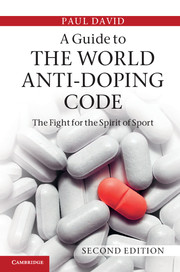Book contents
- Frontmatter
- Contents
- List of Figures
- Preface to the Second Edition
- Table of Cases
- Introduction
- 1 The development of principles relating to anti-doping regimes: the role of the Court of Arbitration for Sport
- 2 Overview of the Code and the World Anti-Doping Program
- 3 The International Standards in more detail
- 4 The nature of the Code and its interpretation and application
- 5 Articles 1 and 2 of the Code: anti-doping rule violations under the Code
- 6 Article 3 of the Code: the proof of anti-doping rule violations under the Code
- 7 Responsibility for testing and investigations, results management and hearings
- 8 Articles 9 and 10 of the Code: sanctions for anti-doping rule violations
- 9 Article 13: appeals under the Code
- 10 Appeals to the Swiss Supreme Court from CAS, challenges to the Code in the courts and claims outside the Code
- 11 The way ahead: review of the 2009 Code
- Index
- References
9 - Article 13: appeals under the Code
Published online by Cambridge University Press: 05 February 2013
- Frontmatter
- Contents
- List of Figures
- Preface to the Second Edition
- Table of Cases
- Introduction
- 1 The development of principles relating to anti-doping regimes: the role of the Court of Arbitration for Sport
- 2 Overview of the Code and the World Anti-Doping Program
- 3 The International Standards in more detail
- 4 The nature of the Code and its interpretation and application
- 5 Articles 1 and 2 of the Code: anti-doping rule violations under the Code
- 6 Article 3 of the Code: the proof of anti-doping rule violations under the Code
- 7 Responsibility for testing and investigations, results management and hearings
- 8 Articles 9 and 10 of the Code: sanctions for anti-doping rule violations
- 9 Article 13: appeals under the Code
- 10 Appeals to the Swiss Supreme Court from CAS, challenges to the Code in the courts and claims outside the Code
- 11 The way ahead: review of the 2009 Code
- Index
- References
Summary
A system for appeal is an important aspect of any court or tribunal system, and, in the context of tribunals established by private bodies such as sports organisations, a right of appeal may play an important role in providing a fair hearing overall to a member of an association who faces a serious disciplinary allegation, such as a doping allegation. On many occasions, in appeals from decisions of anti-doping tribunals, CAS has relied on its power to rehear a matter on the facts and the law on an appeal in order to address and remedy alleged defects in the hearing process before the tribunal which initially heard the allegations. In the hearing system under the Code, the appeal structure also plays another, perhaps more important, role. By providing that Signatories have to adopt Article 13 without significant amendment (with the exception of Article 13.2.2 which provides for the appeal structure at national level) and Article 13.5 (which concerns the rights to appeal to CAS of a party which is subject to a report of non-compliance with the Code by WADA under Article 23.4.5), the Code reinforces the central role of CAS as the appeal tribunal for disputes under the Code. By this means, and by widening the possible parties which have a right of appeal to CAS to include WADA (and other anti-doping organisations), the provisions of Article 13 provide a process of appeal which can be used to foster a consistent approach to the application and interpretation of the Code.
- Type
- Chapter
- Information
- A Guide to the World Anti-Doping CodeA Fight for the Spirit of Sport, pp. 322 - 336Publisher: Cambridge University PressPrint publication year: 2013



